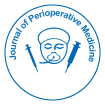
Journal of Perioperative Medicine
Open Access
ISSN: 2684-1290

ISSN: 2684-1290
Opinion Article - (2024)Volume 7, Issue 2
Nursing is not just a profession; it's a compassionate commitment to the well-being of patients. In today's rapidly evolving healthcare landscape, nurses play a pivotal role in ensuring quality care delivery. One importent aspect of nursing practice is staying informed and up-to-date with the latest evidence-based practices. This is where nursing research steps in, serving as a beacon of light guiding healthcare professionals towards providing optimal patient care.
The significance of nursing research
Nursing research is the cornerstone of Evidence-Based Practice (EBP). It involves systematic investigation into various aspects of nursing care, ranging from patient outcomes to healthcare policies. By conducting rigorous studies, nurse researchers generate valuable evidence that informs clinical decision-making and enhances patient outcomes. EBP integrates the best available evidence with clinical expertise and patient preferences, thereby ensuring that healthcare practices are not just traditionbound but are grounded in scientific knowledge.
Driving innovation and improvement
Innovation is at the heart of nursing research. Through pioneering studies, nurse researchers explore new treatment modalities, interventions, and care delivery models aimed at improving patient outcomes. For example, research on pain management techniques has led to the development of innovative approaches that minimize patient discomfort and promote faster recovery. Similarly, studies on nursing interventions for chronic diseases have revolutionized care practices, enabling patients to lead healthier lives.
Empowering nurses
Nursing research empowers frontline nurses by equipping them with the knowledge and skills needed to deliver high-quality care. By engaging in research activities, nurses develop critical thinking abilities and enhance their understanding of evidencebased interventions. This not only fosters professional growth but also instills confidence in nurses to advocate for best practices within healthcare settings. Moreover, involvement in research projects encourages a culture of lifelong learning among nurses, ensuring that they remain updated with the latest advancements in their field.
Enhancing patient safety and quality of care
Patient safety is paramount in healthcare, and nursing research plays a pivotal role in advancing this agenda. By identifying risk factors, evaluating interventions, and implementing evidencebased protocols, nurse researchers contribute to creating safer healthcare environments. For instance, research on medication errors has led to the implementation of standardized protocols and technology-driven solutions to minimize adverse drug events. Similarly, studies on infection control practices have resulted in the development of evidence-based guidelines that reduce the risk of healthcare-associated infections.
Challenges and opportunities
Despite its immense value, nursing research faces several challenges, including limited funding, time constraints, and access to resources. Additionally, translating research findings into clinical practice can be a complex process requiring collaboration among various stakeholders. However, these challenges also present opportunities for innovation and collaboration. By leveraging interdisciplinary partnerships, securing research funding, and embracing technology, nurse researchers can overcome barriers and drive meaningful change in healthcare delivery.
In conclusion, nursing research is indispensable for advancing evidence-based practice and improving patient outcomes. By generating robust evidence, fostering innovation, empowering nurses, and enhancing patient safety, nursing research continues to shape the future of healthcare. As we navigate the complexities of modern healthcare delivery, investing in nursing research is not just a strategic imperative but a moral obligation to ensure that every patient receives the highest standard of care.
Citation: Bader A (2024) Advancing Patient Care: The Role of Nursing Research in Evidence-Based Practice. J Perioper Med. 7:218.
Received: 04-Mar-2024, Manuscript No. JPME-24-29994; Editor assigned: 06-Mar-2024, Pre QC No. JPME-24-29994 (PQ); Reviewed: 20-Mar-2024, QC No. JPME-24-29994; Revised: 27-Mar-2024, Manuscript No. JPME-24-29994 (R); Published: 03-Apr-2024 , DOI: 10.35248/2684-1290.24.7.218
Copyright: © 2024 Bader A. This is an open-access article distributed under the terms of the Creative Commons Attribution License, which permits unrestricted use, distribution, and reproduction in any medium, provided the original author and source are credited.